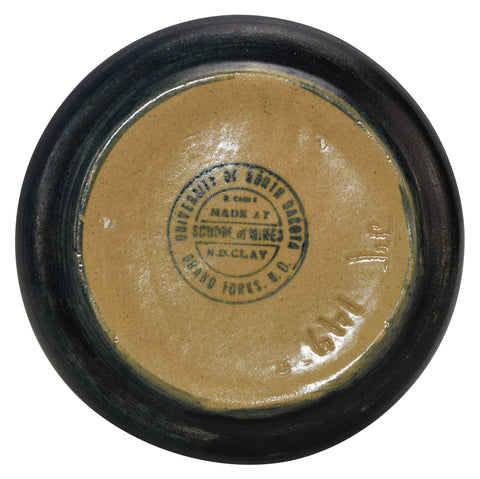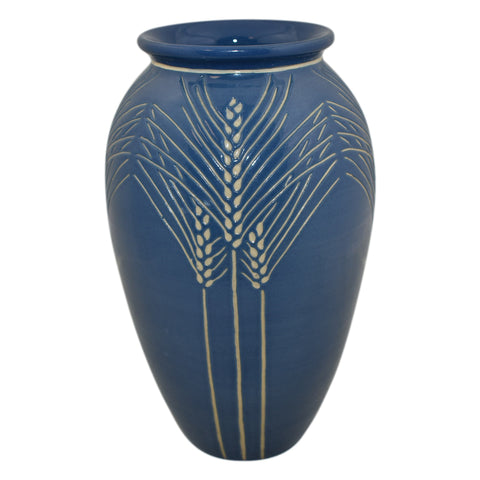University of North Dakota Art Pottery History, Marks, Artists and Dates of Production
History
The University of North Dakota School of Mines came into being in 1890. In 1889 Earle Babcock was hired as a Chemistry instructor. Babcock was the first to understand the potential of North Dakota clay. To advertise and demonstrate the economic potential of North Dakota clay, Babcock determined to exhibit art pottery made from North Dakota clay at 1904 St. Louis Exposition. 
Babcock determined to send North Dakota clay to various art pottery makers, asking them to make art pottery using his clay and to mark the pieces in some way to distinguish the source of the clay. Babcock placed orders with several companies, including Roseville Pottery and Owens Pottery for vases made with his North Dakota clay.
Babcock displayed the art pottery he received from these companies at the 1904 St. Louis Exhibit. Many of the examples were marked with an ND to document their production with North Dakota clay. The University collection contains several dishes incised ND, and a rare Owens Utopian vase incised ND thought to have been displayed in the 1904 St. Louis Exhibit. Included in the University collection is a tray made by Ms. Marcia Bisbee that is marked Bisbee 1904 which is commonly believed to be the earliest known piece of art pottery produced by the University of North Dakota School of Mines (UND).
In 1909, Earle Babcock added ceramic courses to the UND academic offerings. Mr. Babcock and Ms. Bisbee taught the classes within the Chemistry department of the University. The National Corn Exposition in Omaha, Nebraska, provided Babcock another opportunity to display North Dakota produced art pottery. This time Babcock ordered North Dakota clay produced art pottery made by the Handicraft Guild from Minneapolis, Minnesota and Ferock Studio from Zanesville, Ohio. The art pottery received from Handicraft Guild and Ferock Studio for the 1909 Exposition was also marked ND. In 1910 the University of North Dakota hired Ms. Margaret Cable to lead UND’s Ceramics Department.
Marks
University of North Dakota art pottery typically is marked with the blue circular stamp logo bearing the words University of North Dakota Grand Forks, N.D. , Made at School of Mines N.D. Clay. The stamped logo is on almost all UND art pottery produced between 1913 and 1963. The use of the stamp logo ended in 1963 when Julia Mattson retired from the University. Art pottery produced by UND before 1913 was typically marked simply UND.
[prc-collections-carousel]

Artists
Margaret Cable
The University of North Dakota School of Mines hired Ms. Margaret Cable from Handicraft Guild in 1910. After coming to UND, Ms. Cable continued to develop her pottery-making skills by learning from two of the most famous potters in America, Frederick H. Rhead and Charles F. Binns.
The Panama Pacific Exposition in 1915 was the first time Ms. Cable was able to have North Dakota art pottery displayed nationally. The 1933 Century of Progress Exposition in Chicago provided another opportunity for Cable to gather national attention for UND pottery as well as her skills. These exhibits greatly helped expand the national interest in UND pottery as well as Ms. Cable’s influence. In 1937, Ms. Cable spent six months teaching pottery making and training teachers for what ultimately became Pine Ridge Pottery.
Margaret Cable retired from the University of North Dakota in 1949 after a long and significant career. Ms. Cable subsequently moved to California, where she died in 1960.
Artist cipher or signature marks used on UND art pottery made by Margaret Cable include M. Cable, MKC, MC, Maggie, and Maggie Mud.


Hildegarde Fried
Ms. Hildegarde Fried was the first teaching staff member added to the University of North Dakota School of Mines Pottery or ceramics department. Ms. Fried graduated from the UND in 1913. In 1918 she was hired by the University. She worked in the UND Ceramics Department until 1924. Artist cipher or signature marks used on UND art pottery made by Hildegarde Fried include Freid and HF.
Flora Cable Huckfield
Mrs. Flora Huckfield was the sister of Margaret Cable. Mrs. Huckfield joined the UND pottery staff in 1924. University of North Dakota records do not list her as a faculty member after 1930. However, Mrs. Huckfield remained active at the University, helping her sister Margaret Cable until they both retired in 1949.
Artist cipher or signature marks used on UND art pottery made by Flora Cable Huckfield include Huckie, Huck, Huck in a circle, FCH, H, and H in a circle.

Julia Edna Mattson
Ms. Julia Mattson joined the University of North Dakota Pottery or ceramics department faculty in 1924 the same year she graduated from the school. She spent the next thirty-nine years teaching in the Ceramics Department. She was a hard worker and extremely devoted to the production of UND art pottery. Ms. Mattson continued making art pottery at UND until her retirement in 1963. Ms. Julia Mattson later moved to California, where she died in 1967.
Donald Miller’s University of North Dakota Pottery – The Cable Years notes that when Ms. Mattson retired, the University discontinued the use of the blue stamp logo seen on almost every piece of UND art pottery.
Artist cipher or signature marks used on UND art pottery made by Julia Mattson include JM, JEM, and Mattson.

Frieda L Hammers
Ms. Hammers was also a student in the UND Ceramics Department before becoming a teacher. She received her Master's degree in 1925 and started work at the University in 1926. Ms. Hammers was meticulous in her work in her test of UND art pottery glazes and clays. She continued to teach and make UND art pottery until 1939. At that time, Ms. Hammers retired due to health issues. She subsequently moved to California, where she died in 1977.
Artist cipher or signature marks used on UND art pottery made by Frieda L Hammers include FLH, FH (reversed F), and Hammers.


Margaret Pachl
After the retirement of Margaret Cable in 1949, Margaret Pachl became the assistant professor of UND ceramics. Before her time at UND, Ms. Pachl worked at the Kalamazoo Institute of Fine Arts. She worked and produced art pottery at UND until 1970. After leaving UND, Ms. Pachl maintained an art pottery studio in Eureka Springs, Arkansas, until she died in 1982.
Identification Numbers
It is possible to date some UND art pottery produced between 1918 and 1939 by matching up the artist mark and identifications numbers documented in Donald Miller’s University of North Dakota Pottery – The Cable Years. That table broken down by artist is below.
Flora Cable Huckfield
|
Year of Pottery Production |
Design Number on Bottom of UND Vase |
|
1924 |
450 to 520 |
|
1925 |
521 to 574 |
|
1926 |
575 to 703 |
|
1927 |
704 to 729 and 1 to 457 |
|
1928 |
458 to 549 |
|
1929 |
550 to 914 |
|
1930 |
915 to 1099 and 2000 to 2285 |
|
1931 |
1100 to 1613 and 2286 to 2297 |
|
1932 |
1614 to 1999 and 2298 to 2406 |
|
1933 |
2407 to 2791 |
|
1934 |
2792 to 3700 |
|
1935 |
3701 to 4237 |
|
1936 |
4238 to 4910 |
|
1937 |
4911 to 5056 |
Julia Mattson
|
Year of Pottery Production |
Design Number on Bottom of UND Vase |
|
1928 |
352 |
|
1929 |
1 to 243 |
|
1930 |
244 to 470 |
|
1931 |
471 to 724 |
|
1932 |
725 to 966 |
|
1933 |
967 to 2023 |
|
1934 |
2024 to 2463 |
|
1935 |
2464 to 2873 |
|
1936 |
2874 to 3381 |
Freida Hammers
|
Year of Pottery Production |
Design Number on Bottom of UND Vase |
|
1928 |
1 to 107 |
|
1929 |
108 to 346 |
|
1930 |
347 to 497 |
|
1931 |
498 to 614 |
|
1932 |
615 to 775 |
|
1933 |
776 to 835 |
|
1934 |
838 to 857 |
|
1935 |
858 to 861 |
|
1936 |
862 to 922 |
|
1937 |
923 to 1227 |
|
1938 |
1228 to 1370 |
Hildegarde Fried
|
Year of Pottery Production |
Design Number on Bottom of UND Vase |
|
1918 |
50 to 98 |
|
1919 |
99 to 159 |
|
1920 |
160 to 165 |
|
1921 |
166 to 205 |
|
1922 |
206 to 268 |
|
1923 |
269 to 348 |
For example, Flora Huckfield and Freida Hammers signed the University of North Dakota vase below. The vase was painted by Ms. Huckfield and thrown by Ms. Hammers. By using the identification number 3840 on the bottom of the vase and the table for Ms. Huckfield, you can determine the vase was made in 1935.

Freida Hammers made the blue wheat stalk vase below. Bottom markings on the vase include the UND logo, Ms. Hammers cipher, identification number 597 and (S) Sorlie. The vase is from 1931 as determined using the identification number 597 on the bottom and the table for Ms. Hammers.





